UPDATED 5 Aug 2015- see below
I suspect a lot of people have never seen much of the "Monty Carstairs" strip in the Mickey Mouse Weekly and I love the 'controlled' nature of Bellamy's early work. As listed on the website Bellamy drew "Monty Carstairs" from 25 July 1953 till 26 June 1954. he drew four stories, outlined below. From the first episode he had the full page but from 12 December 1953 to the end of his run Bellamy loses a sixth of the page to a comic strip cartoon. All his art is linework in black and white ink. The other strips in the comic in black and white are interesting to compare to as even here, Bellamy's earliest regular comic strip job, he tries to break the panel boundaries in his artwork.
Before we get to Bellamy's work I thought you might like to see some of the rest of the comic to give you a bit of context.
 |
| Mickey Mouse Weekly 13 Feb 1954 - Cover |
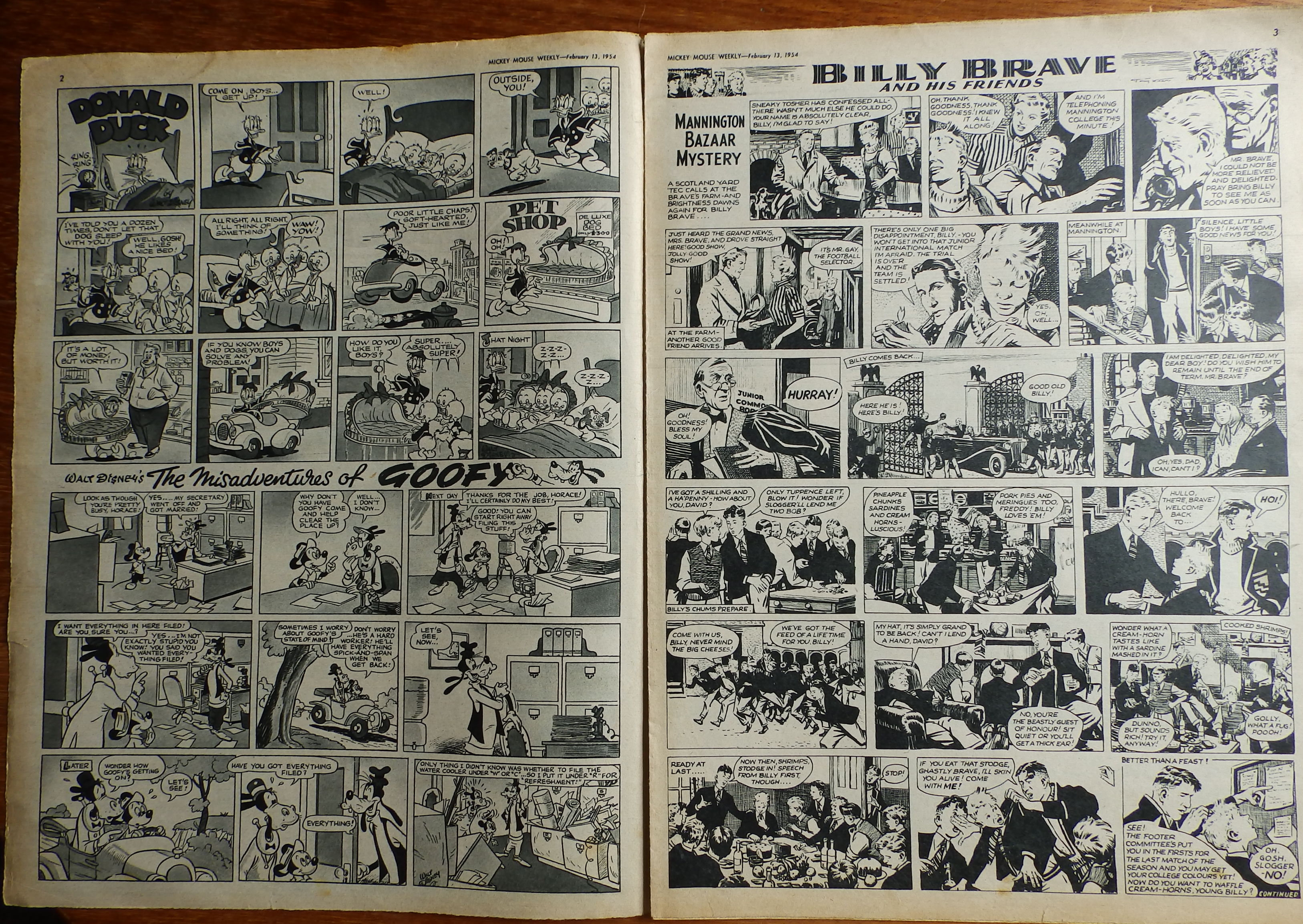 |
| Mickey Mouse Weekly 13 Feb 1954 pp2-3 |
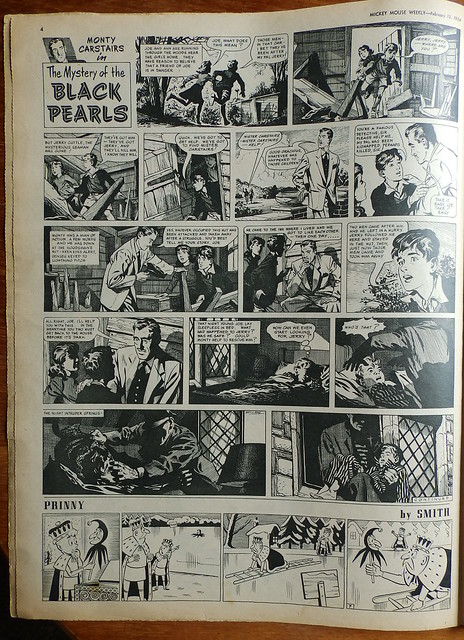 |
| Mickey Mouse Weekly 13 Feb 1954 p4 |
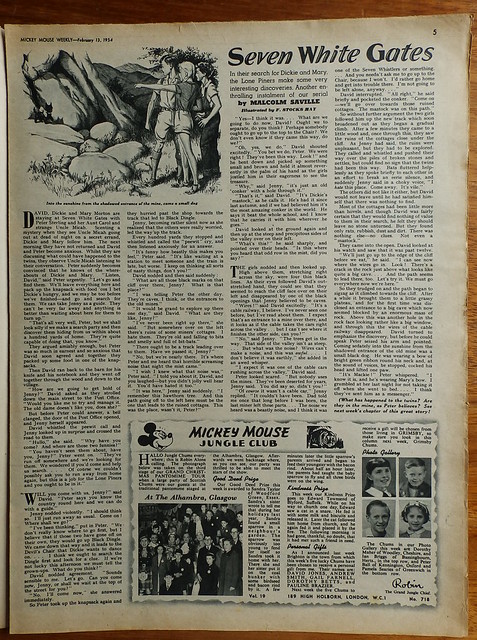 |
| Mickey Mouse Weekly 13 Feb 1954 p5 |
 |
| Mickey Mouse Weekly 13 Feb 1954 pp6-7 |
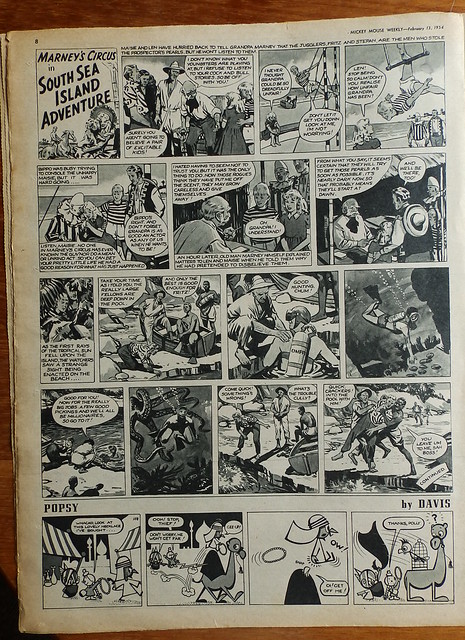 |
| Mickey Mouse Weekly 13 Feb 1954 p8 |
 |
| Mickey Mouse Weekly 13 Feb 1954 p9 |
Page 10 featured "Robin Alone" (which I have seen credited to Tony Weare, Bill Lacey and 'Unknown' - I'll vote for the latter for this particular episode and Lacey for many others I've seen! - however David Slinn has identified this as Bill Lacey - see below and he credits my 'unknown' artist as Edward Osmond) and Donald Duck's nephews "Huey, Dewey, and Louie"appear at the bottom of the page
 |
| Mickey Mouse Weekly 13 Feb 1954 p10 |
 |
| Mickey Mouse Weekly 13 Feb 1954 p11 |
Page 12, the back cover, has a strip adaptation of Disney's film "Rob Roy" which premièred 26 October 1953 in the UK drawn by Patrick Williams (thanks David Slinn for the identification).
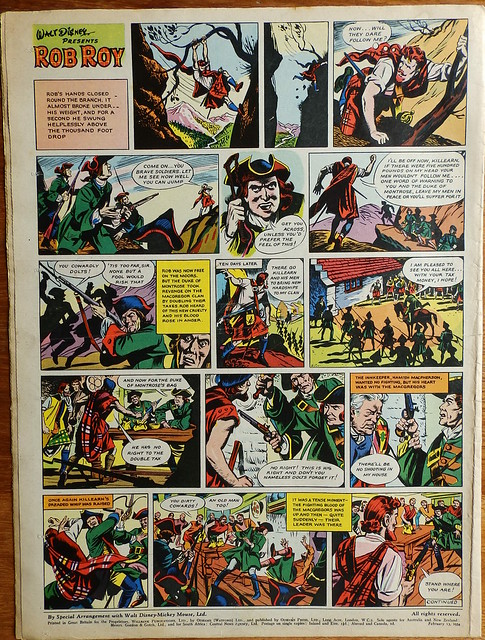 |
| Mickey Mouse Weekly 13 Feb 1954 p12 |
Now let's get to Bellamy's art in "Monty Carstairs". The artwork is lovely and clear (if not in my photos, forgive me!) and it doesn't take long for Bellamy to experiment - strictly in the constraints of 5 or 6 row strip
MONTY CARSTAIRS
As far as I can see Monty Carstairs started some time just before April 1951 and was drawn by Cecil Orr, I think. (Issues I've seen in 1949 and up to December 1950 do not have Monty Carstairs). The excellent Inducks database says 25 August 1951 (unless I have misinterpreted and they mean the start of that particular story "The Green Dolphin"?). eBay searches show it's likely this might be the case as I have found "Red for Danger!", a Monty Carstairs Special agent cartoon serial story" mentioned for the issue dated 7 (and 24) April 1951. According the same eBay seller 7 July 1951 has the story "The Prisoner of the Chateau". Details are so sketchy for this series, if you can help I don't mind changing this.
The monocled Carstairs appears to be a common fictional device in the mould of Lord Peter Wimsey, who also wore a monocle and was the detective character created in 1923 by Dorothy L. Sayers.
1) The Secret of the Sands story has "the famous detective", "the prince of private investigators", "the gentleman adventurer" Monty Carstairs visiting Sandypoint Cove, Cornwall, where Tony and Mary Peers discover a German u-boat and some men who are up to no good! We learn that Carstairs' bowler-hatted "Siamese servant" is called Mr. San, which could be translated from the Japanese as "Mr. Mr." - but kids were not so sophisticated back then and are likely not to have noticed this slight discrepancy!
In the third row (above) we see Bellamy beginning to stretch himself and show something different.
I'm not suprised this is the page often reproduced as the villain looms large in intimidating the boy, especially with those thick lenses in his spectacles.
The second row here shows a telephone conversation - the pictures angled to add emphasising the device
2) The Mystery of the Musical Box has Sally Rogers and her twin cousins David & John visiting their Aunt Sophie's eponymous antique shop in Waterberry. But the story also involves an actual musical box too as the group solve the mystery of a missing painting
In this interesting page we see Bellamy's competent handling of architecture, internal and external. I wouldn't be surprised if the two buildings shown are somewhere around Kettering, his home town, - ask me sometime about the pub in Bellamy's Garth strip. I love the angles in this page too.
The middle panel here showing the car driving through a town, may not be perfect perspective but the houses look so interesting with a castle behind
I've blown up the panel that I love, with the description "beneath the starry sky that night..." we see the light of the moon shining in by virtue of the stark shadows and again detailing that makes the image so impressive.
3) The Mystery of the Black Pearls is the first story where Bellamy condenses the title to one panel (not the whole row as previously) in order to make room for the cartoon strip "Prinny" below. Joe is the orphaned nephew of Mr & Mrs Muggins (!) who own "The Shifted Anchor" pub. Joe, and a friend he makes, called Ann, help Carstairs solve the mystery.
Notice the third row and second panel above, where Bellamy, not uniquely, abandons the formal frame.In the example below he extends the last two panels across the usually 3 or 4 framed rows
 |
| Mickey Mouse Weekly 1954 February 13, p4 |
4) The Men from the East is unusual as it has a very grown-up theme, a missing British offical in Tibet and no children take part! I found the art to be rushed and not very exciting as it's set in Tibet there are lots of mountainous rocky outcrops which Bellamy was so adept at drawing but don't make for a great story. I think his mind was elsewhere at this point.
Strangely on 10 September 1954 the final story illustrated by Bellamy began its appearance in The Sydney Morning Herald and one part is available from the Sunday 26 December 1954 edition thanks to the excellent TROVE website. Can any of my Antipodean friends tell me more?
UPDATE from David Slinn (August 2015):
The most recent piece, covering the 1954 Mickey Mouse Weekly and your particularly detailed look at ‘Monty Carstairs’, was especially enlightening. Noting with interest, the resulting comments about how far ahead of “the field” he was, it does seem slightly puzzling this was Frank’s first major venture with a weekly strip. My theory, no more than that, is the post-war page-rates for adventure strips being pretty dire at the Amalgamated Press, and even more abysmal in Dundee, Odhams Press actually had – by comparison – a very generous scale of fees. Only when the Hulton Press entered the children’s market, was there anywhere else he could have earned, relative to magazine and advertising illustration, what he (or International Artists?) would consider – for the standards of artwork Frank strove to attain – a satisfactory living.
I’ve always regretted [despite, parental pressures on tidying-up, actually being responsible?] no longer having the issues of Mickey Mouse Weekly, sparsely purchased out of limited pocket-money, along with very early copies of Eagle.
I’ve a clear recollection of the first ‘Billy Brave’ story, starting in October 1950, when the Odhams’ title was enlarged and extensively revamped, to compete with Hulton’s phenomenal success. Billy’s hero was Stanley Matthews and the original story, drawn by Tony Weare, revolved around the frail youngster’s soccer ambitions, which were still apparently being pursued in February 1954. Briefly here: I’d say the ‘Robin Alone’ episode (though, it goes out of focus if enlarged) is Bill Lacey; as you mention, Tony Weare did draw some of the earlier series, while I’m fairly certain your probable “unknown”, was Edward Osmond – even, if it seems unlikely. The ‘Marney’s Circus’ adventure, has the look of being Tony Weare’s artwork, and therefore a reprint – which, over the years, particularly with ‘Robin Alone’, Odhams weren’t averse to utilising. ‘Popsy’ is the Roy Davis, of later prolific cartoon output and, while it obviously puzzled you, the ‘Rob Roy’ adaptation is none other than, Patrick Williams.









4 comments:
Frank told me that when he worked on Mickey Mouse Weekly, the artists had to sign their work Walt Disney, but the only way he could duplicate Walt's signature was to write it upside down!
Thanks for that Tony, always good to hear from you.
It's an odd co-incidence that Frank's first major comic strip work has so much in common with his last, ie Garth. Time and experience sharpened his skills of course but it's fascinating to see just how much was there at the very start - especially the way he used linework to depict shadows and background textures - compare some of the art samples you have shown with some of his more atmospheric Garth strips like the Wolfman of Ausensee and you'll see what I mean, Another great post Norman - thanks again from your fan club!!!!!
Bill Storie
Thanks for the compliment Bill. I'll keep going as long as I have stuff to share!
Post a Comment